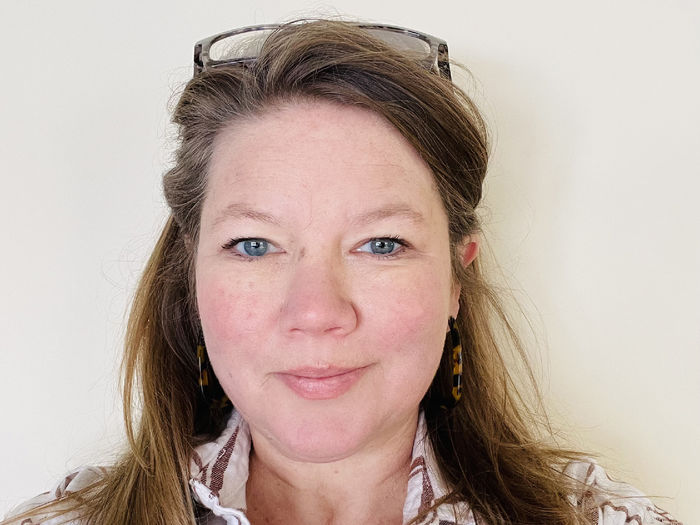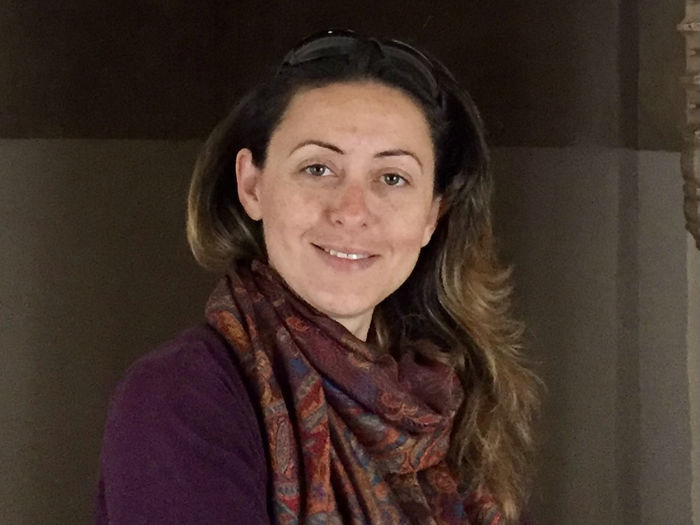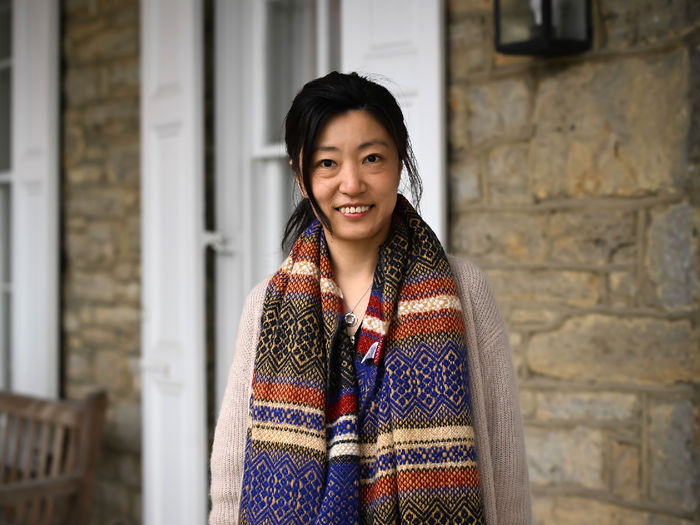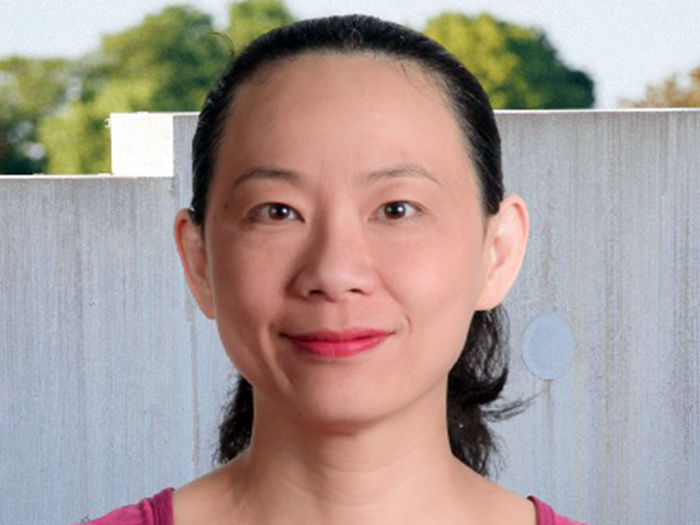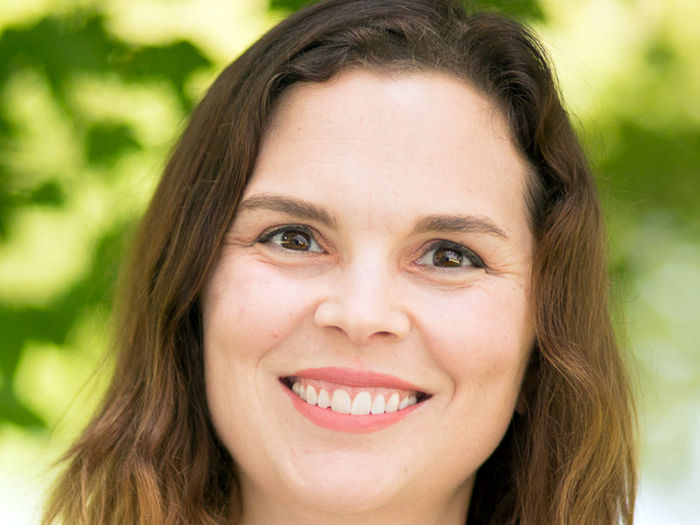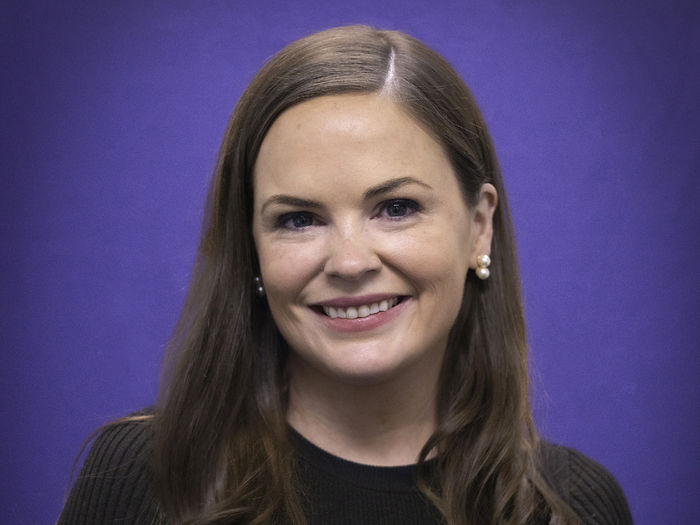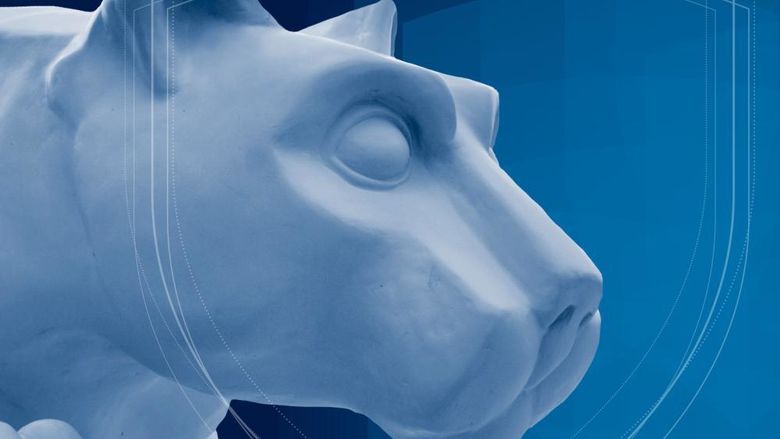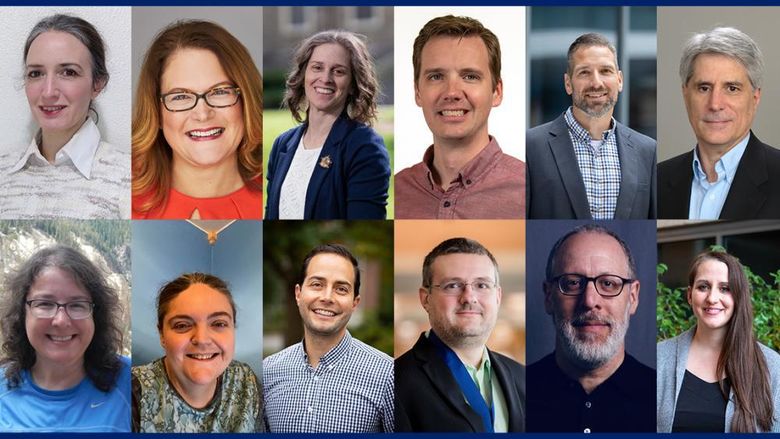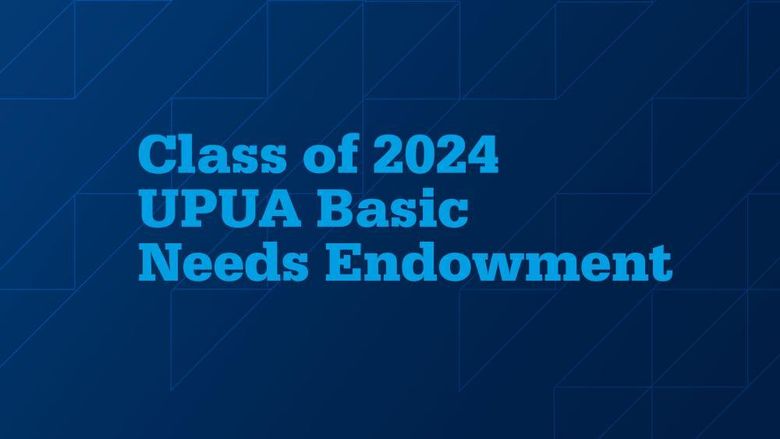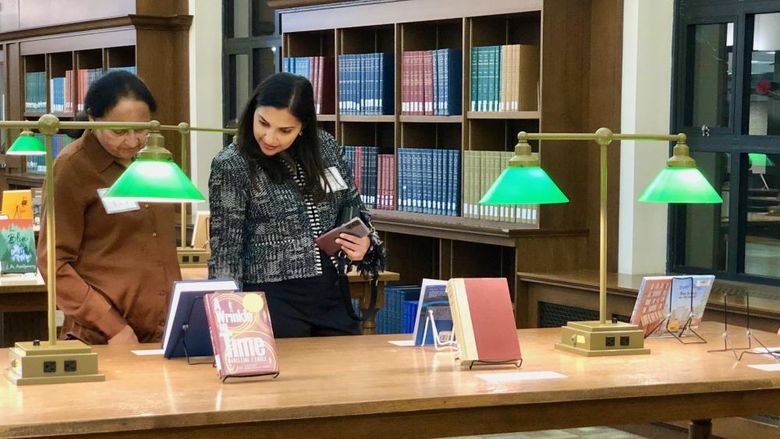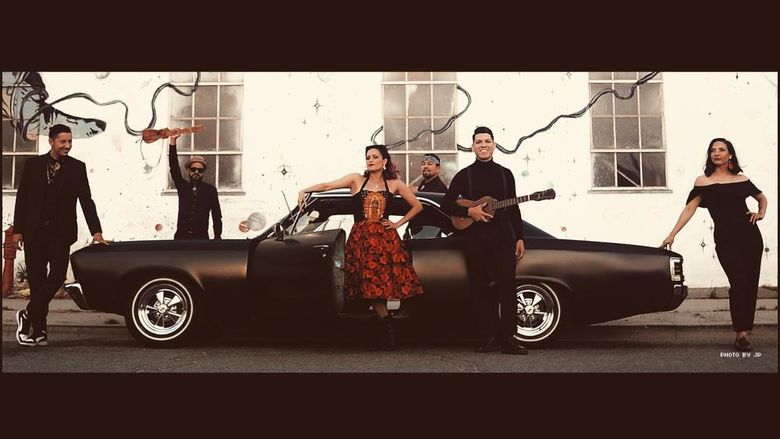UNIVERSITY PARK, Pa. — Six Penn State faculty members have received the 2024 George W. Atherton Award for Excellence in Teaching.
They are Sommar Chilton, associate teaching professor of communication sciences and disorders in the College of Health and Human Development; Linda Istanbulli, Caroline D. Eckhardt Early Career Professor of Comparative Literature and assistant professor of comparative literature and Arabic in the College of the Liberal Arts; Siu Ling "Pansy" Leung, associate teaching professor of mechanical engineering in the College of Engineering; Kuei-Nuan Lin, associate professor of mathematics at Penn State Greater Allegheny; Sarah Nilson, assistant professor of biology at Penn State Beaver; and Kara Stone, assistant teaching professor of English at Penn State Scranton.
The award, named after Penn State’s seventh president, honors excellence in teaching at the undergraduate level.
Sommar Chilton
Chilton paints a picture of the first day a student sits in her classroom during her "American Sign Language I" course: She enters the room and begins to sign the introduction to the course, her voice silent as she goes on for the next two minutes, describing herself and her expectations for the course. As she continues, students begin to look around, wondering if they’re alone in their confusion.
She breaks her silence and asks the room if anyone understands before telling the class that, if they both commit to the class and do what’s expected, they’ll easily understand what she just said.
It’s a stark contrast to what happens at the end of the course.
“Sixteen weeks later, after introducing vocabulary and structures of American Sign Language, going through activities and quizzes, and working outside of class on log time and lab homework, I sign the monologue for a second time,” Chilton said. “The students watch my face and hands again and, this time, nod along in understanding — eyes bright with comprehension. This result is why I enjoy doing what I do. Although our learners and I have changed over the last 20 years of teaching, I find the best education happens in a shared environment of respect, opportunity for everyone and commitment to success.”
Chilton said teaching people sign language and Deaf culture begins with dispelling some of the main misconceptions about being Deaf. In one of her first assignments, she asks students to watch a video where Deaf signers translate the John Mayer song “Waiting on the World to Change” from English into American Sign Language. It features statements about deafness and Deaf culture.
She asks the group to reflect on what they just saw and inevitably a few misconceptions are voiced, such as Deaf people want to be cured, having a Deaf child is a tragedy or that Deaf people live in a silent world.
Understanding these misconceptions, she said, is the first step to understanding how Deaf people communicate and how hearing people can best communicate with them.
“In the Deaf culture courses, we spend the semester examining deafness from the cultural perspective and not the disability or medical perspective,” Chilton said. “I encourage the students to not use the term hearing impaired but replace that with the preferred identity terminology of Deaf person. We look at history, family, language, education, technology, employment and more. We work to respect the linguistic and cultural differences of Deaf people and learn to support the goals and choices that this unique group set for themselves.”
At the end of the same course, when she again shares the John Mayer video, students have a much different reaction.
“The amazing answers that students develop show me that we are in good hands with this next generation,” Chilton said. “They want to know and see differences in people not as barriers but as opportunities for everyone.”
Former students said Chilton is committed to engaging and inclusive teaching.
“Even though her purpose was to educate, she was able to get people to care about the topic and feel comfortable in the classroom with their peers, which led to a greater level of knowledge within the classroom,” a former student said. “She leads by example, inspiring all students to get involved within the Deaf community.”
Linda Istanbulli
Istanbulli is a teacher who is dedicated to helping her students see the end goal: She teaches so that students will one day apply that knowledge in their lives and careers after they leave Penn State.
It’s not every day that she gets to see the fruits of her labor. But it does happen.
“As I took my seat at the Middle Eastern Studies Annual Meeting to watch a documentary about the effects of climate change in Tunisia, I felt a tap on my shoulder. To my surprise, it was Sam McNeil, who had been a student of mine a few years earlier,” Istanbulli said. “Sam, I learned, had earned a dual master’s degree in journalism and Middle Eastern Studies and the documentary was his. As Sam eagerly told me about his time in Tunisia and the Excellence in International Journalism award that he had just been awarded, he was also highlighting how he had applied learnings from our classroom to his drive to fight for a healthy planet. This moment exemplifies my goal as an educator: to provide students with the knowledge and tools that build their capacity to contribute in the classroom and far beyond.”
Istanbulli creates an environment where students are encouraged to learn and apply those lessons beyond the classroom in several ways.
She encourages active and interdisciplinary engagement with the texts. This approach relies on group discussions, collaborative research and self-directed writing assignments. In her classroom, students are comparing and contrasting work by female authors from the global south, for instance, to reflect on the complex configurations of female subjectivity and agency. Diving deeper into the meanings of the work helps us avoid reiterating preexisting views and allows students to bring their own perspectives and experiences into the classroom, she said.
She knows she’s part of that process and needs to engage students using the tools that work best for them. That includes incorporating creative alternatives to traditional research options, such as creating podcasts, videos and visual projects or by utilizing Penn State courseware platforms and online applications.
It’s all part of a process, she said, where students take ownership of the course. She encourages her students to suggest reading material, which gives them a chance to shape the course syllabus, opening it up to diverse interests and approaches. She takes their feedback to heart and is always looking for ways to build using their input. She’s also always looking for ways to learn about them through class discussions and an early-semester survey to assess their goals, needs and avenues of support.
She said this partnership leads to a safe, welcoming and equitable learning environment.
“Taking a genuine interest in learning about each student and their unique experience helps establish trust and allows me to form a bond with them so they feel valued,” Istanbulli said.
Istanbulli’s students praised her knowledge, her prolific research and her exceptional contributions to her field. But what stands out, they said, is her ability to communicate that knowledge.
“Professor Istanbulli possesses an unparalleled passion for literature. Her enthusiasm for the subject matter ignites a love for literature in her students, fostering a deep appreciation for the written word while creating a vibrant and intellectually stimulating classroom environment,” a former student said. “What sets her apart is her dedication to personalized education. She takes the time to understand each student’s unique learning style, adapting her teaching approach to ensure that every student reaches their full potential.”
Siu Ling "Pansy" Leung
Leung inspires and empowers her students through the transformative power of education. She equips them with the vital skills to succeed in their chosen field while showing them the importance of their work.
“As engineers, they have the potential to make significant contributions to a more resilient world,” Leung said. “My teaching philosophy centers on real-world applicability, critical thinking, problem solving and student-centered learning. Additionally, my commitment to inclusivity, diversity and continuous improvement greatly influences my teaching strategy.”
She said her students leave with real-world relevance; they’re able to connect core concepts and theory with practical applications. She changed the curriculum to reflect that by consolidating elective lab courses into one comprehensive mechanical engineering systems laboratory.
There, students apply these core concepts to solve complex challenges in areas such as machine learning, turbine cooling, additive manufacturing, autonomy, robotics and energy.
“Additionally, we equip students with essential practical skills, including data acquisition, analysis, numerical simulation, design of experiments and communication,” Leung said. “This ensures they are not only knowledgeable but also adept problem solvers, prepared for the challenges of modern engineering.”
Leung said she bases her teaching on Bloom’s revised taxonomy: remember, understand, apply, analyze, evaluate and create. The lessons begin on memorization but quickly morph into understanding, applying, analyzing and eventually evaluating and creating their own engineering solutions.
“We aim to provide students with opportunities to create solutions,” Leung said. “Students will integrate technologies or machine parts to create and control a small robot. One example is combining their knowledge in robotic controls and kinematics, deep learning, path planning and image processing to solve the challenge of controlling an autonomous vehicle to follow a planned route and traffic instructions.”
The goal, she said, is to create engineers who are critical thinkers and problem-solvers.
One way Leung accomplishes that is through student-centered learning. She takes on the role of both facilitator and instructor, relishing the sight of students actively engaged in their own learning. Students who are active in the process, she said, have the tools to become successful engineers.
That’s why her lessons are about exploration and analysis, rather than solving for immediate solutions. One example she cited is a challenge related to preheating lithium-ion batteries in the context of teaching heat transfer. Students research why battery performance is reduced and apply their knowledge to ways that performance can be sustained.
“This fosters lifelong learning and equips students with confidence and a proactive mindset for their academic and professional journeys,” Leung said.
An example is presenting a challenge related to preheating the battery. This encourages independent research into why battery performance is reduced in cold weather and how we can sustain their performance using knowledge of heat conduction and convection.
She’s also dedicated to diversity and inclusion, recently spearheading the creation of vital teaching resources for core courses. The goal of integrating diversity equity and inclusion into engineering courses, she said, is to heighten student awareness and empathy for global issues like water scarcity, health care and urbanization.
“I am dedicated to creating a learning environment that fosters curiosity, innovation and a passion for excellence,” Leung said. “My approach enables a dynamic and inclusive learning environment that empowers students to become proficient and adaptable engineers.”
Students said Leung tailors her courses to helping them succeed and has a genuine knowledge for getting to know her students.
“There is no challenge that Dr. Leung will allow her students to face alone,” a former student said. “While she provides them with the tools to have full autonomy, she provides support from afar that keeps driving students forward. The excitement she brings into a classroom or lab encourages fascination in the subject matter among her students. This engagement provides a platform for open communication and problem-solving between her and her students.”
Kuei-Nuan Lin
Lin said mathematics education is a path of intellectual growth while teaching mathematics is a lifelong learning endeavor. Her job is done when students realize their highest potential, inside and outside the classroom.
“I am deeply gratified when I witness students realizing their highest potential, both mathematically and personally,” Lin said. “My teaching methodology is firmly rooted in evidence-based practices and is designed to adapt to the unique needs of our students.”
Many of her students are first-generation students and/or Pell Grant recipients who are realizing this potential for the first time. To bridge the gap for the diverse student population, Lin created a trio of free interactive online textbooks that feature quizzes, videos and tools for self-assessment.
“These textbooks prioritize inclusivity, with screen reader compatibility and one text being captioned. Not only does this approach accommodate disabilities, its cost-free nature helps bridge economic gaps, ensuring accessibility for all learners,” Lin said.
Lin uses a flipped classroom approach that allows direct interaction with students, followed by adjustments and assistance. Tools like Top Hat, quizzes, 3D-printed models and augmented reality cubes help students grasp the spatial reasoning of her calculus courses. She also relies on learning assistants to aid her students through peer support.
“A significant lesson my students take away from my classroom is to have the courage to embrace mistakes and persist in the face of challenges,” Lin said. “They believe that they can learn mathematics regardless of their starting point, fostering a growth mindset. This approach enhances immediate learning, promotes long-term knowledge retention, and develops problem-solving, critical thinking and collaboration skills. Research supports active teaching methods for equitable education outcomes.”
For her best students, Lin offers honors opportunities and independent research study courses so that students can explore the real-world application of mathematics. Of the seven Schreyer Honors College Scholars from the Greater Allegheny campus, six benefitted from her guidance.
Lin continues to learn, too. She utilizes resources such as Teaching and Learning with Technology, the Schreyer Teaching Institute and the Mathematical Association of America, so that her approach remains current and is guided by a community of top experts.
“My unwavering dedication to self-improvement and lifelong learning is central to my role as an educator, and I am committed to this ongoing pursuit,” Lin said.
Former students called Lin a caring and dedicated educator who motivates and challenges her students.
“Dr. Lin’s teaching abilities and exceptional knowledge of mathematics often overshadows the love she has for her students,” a former student said. “I have never felt a professor care about me and my peers the way she has. She knew we all had potential to be great, and she made sure we knew it every single day. Being a great teacher is one thing, but being a great person is something that I appreciate about her. For me, she is unparalleled; she pushed me further than any other professor I have ever encountered.”
Sarah Nilson
Nilson, who teaches both entry- and upper-level courses in biology, said she approaches her courses with three goals in mind: to make learning authentic, engaging and inclusive for all students. She’s training both future biologists, and those taking the course for general education, so she must alter her approach depending on the audience.
Her curriculum is guided by the U.S. National Science Foundation (NSF) Vision and Change Core Concepts and Competencies. She’s always finding interesting ways to make courses more engaging such as experiments, journal articles and problem-based learning.
For entry-level students, she has them learn about biology by growing plants in a friendly competition among classes. That effort earned Nilson the Royer Award in 2022 and the Penn State Beaver Advisory Board’s Excellence in Teaching Award in 2023 for her use of innovative and engaging teaching practices.
Plants produced in the course are sold with all profits going to food sustainability projects, such as purchasing a produce cooler for Beaver’s Lion’s Pantry.
“These classes allow me to expose non-science majors to the wonders of the natural world,” Nilson said. “In these courses, I have more curriculum flexibility and I can experiment even more with my teaching methods than in biology core courses. I have found that student engagement is key in gen-ed courses because students do not always enter the class interested in learning about plants and nature. I use tastings, workshops, guest speakers, service-learning projects, field experiences and nature walks to enhance student engagement and learning.”
For her biology majors, she takes a different approach. She flips her classroom to allow class time to be used for experiments and independent research.
In one course on plant anatomy, students are assigned a plant gene to characterize. From there students study mutations in their assigned gene, amplify and sequence the mutation and use bioinformatics to create protein models for the mutations. Students then detail the findings just like they would crafting a publication for a scientific journal.
“This project is an authentic research experience that includes all NSF Core Competencies and reinforced many of the NSF Core Concepts they have learned in their 200-level biology courses,” Nilson said.
Nilson herself continues to learn. In 2021, she completed the Universal Design for Learning (UDL) short course through the Schreyer Institute for Teaching Excellence. UDL uses neuroscience-based teaching and learning strategies to reduce or eliminate barriers to student learning.
Nilson said the approach reduces barriers for student learning and gives students the freedom to access course material and learn in a way that’s most productive for them, rather than taking a one-size-fits-all approach to learning.
“My teaching methods and assessment are ever evolving,” Nilson said. “My view of fairness in education is not about giving all students the same exam or using the same grading rubric, it is about giving students equal opportunities to learn.”
Former students praised Nilson’s flexibility as an educator and for making them feel like peers in the process.
“Learning biology with Dr. Nilson was how higher education should be: always very challenging and always interesting,” a former student said. “She makes her lectures easy to follow and engaging by being conversational with the material instead of engaging in abstract, passionless rhetoric. She was also adept at bringing the subject to real life and making it relatable across disciplines and personal interests.”
Kara Stone
Stone recalled the time a student told her she respected her ideas more than any other teacher. The student described her classroom as “self-care” because it was a place where she felt safe.
“Her words resonated with me because I strive to create a classroom environment where everyone feels appreciated and valued,” Stone said. “My teaching philosophy is based upon connecting with students on their terms, making them feel heard, empowering them to listen to others and then challenging them to achieve their personal best.”
It’s in this environment that Stone helps students achieve their goals through critical thinking, persuasive writing, independent research and professional competency. She does this through instruction, engagement and service.
Because students are each unique, Stone is committed to an engaged learning environment that fits all learning styles. She says she’s also realistic about deadlines since students are juggling multiple responsibilities. Her students come from varied socioeconomic backgrounds and have differing academic goals, needs and career objectives.
Stone finds resource materials from sources such as news articles, music, art and social media. Her lessons are filled with student-led discussion, short online writing prompts and peer-review activities.
“When reading medieval or classical texts, I encourage students to invest in the course through contributing to a class playlist by uploading a song along with a response essay that argues for how the song relates to a theme or scene,” Stone said. “My passion for teaching and guiding students is illustrated through my integration of texts that highlight current social issues that inspire my students to become advocates for change and leaders in their communities. I purposely choose assignments and readings that push students to think outside of their comfort zones and teach them to question their ideas, as well as others, while simultaneously learning to create logical arguments.”
Stone considers herself a lifelong learner who is always seeking areas for improvement from her students. She said she learns from their feedback and from professional development workshops.
Stone, who is an adviser and organizer of the campus’ undergraduate research fair, engages her students by encouraging them to pursue research and professional goals. The importance of research is something she learned from seeking feedback from students: many cite research as a highlight of their college experience.
She said she’s not just an educator, but an advocate for her students.
“When I advocate for students, give them attention, and care about their progress, I have found they have a greater chance of wanting and achieving success, and they are more likely to succeed with me, and in turn, help others succeed in the process,” Stone said.
Former students praised Stone’s passion for the subject matter and her ability to make the courses engaging and relevant.
“Her teaching sparked a passion for research and for presenting my research,” a former student said. “She showed the class how to think critically about our beliefs and present them in ways I was unfamiliar with, but quickly grew accustomed to after her teachings and interactive class sessions. She often used legitimate and relatable real-world examples to demonstrate different topics, making the course feel personal and relevant.”
